Caliente Sportsbook App
In 2008, gambling interests and others spent $154 million battling over the expansion of wagering at Native American casinos, the third-highest amount spent on California initiative campaigns in the state’s history.
California voters will decide in 2022 whether to allow sports betting
Californians would be able to legally bet on Lakers, Dodgers and Rams games at tribal casinos and horse-racing tracks under an initiative that qualified Thursday for the November 2022 ballot, touching off what is expected to be an expensive battle with excluded card clubs over who should benefit from the potential billion-dollar market.
The constitutional amendment to allow sports betting was written by Native American tribes that showed their political might in 2008 when they spent $115 million to win approval of four ballot measures that preserved an expansion of gambling they had been granted a year earlier.
“This is an important step toward giving Californians the opportunity to participate in sports wagering while also establishing safeguards and protections against underage gambling,” said Mark Macarro, tribal chairman of the Pechanga Band of Luiseño Indians, one of the 18 tribes that are part of the Coalition to Authorize Regulated Sports Wagering behind the ballot measure.
On the other side, card clubs left out from a share of the sports wagering are expected to spend a significant amount of money to oppose the new ballot measure, which they have referred to as an attempt to monopolize the gaming industry. The campaign committee called “No on the Gambling Power Grab” reported raising more than $1 million in cash contributions last year.
“This initiative does nothing to advance sports wagering, and instead expands the tribal casinos’ tax-free monopoly on gaming and rewards those operators for prioritizing their own wealth over public health and safety,” said Kyle Kirkland, president of the California Gaming Assn.
Momentum is building in California to legalize wagering on athletic contests, setting off intense competition among rival gambling interests.
California is late to the game. Three years after the U.S. Supreme Court removed legal barriers to states allowing sports betting, wagering on football, baseball, basketball and other sports has been legalized in 26 states, including New York, New Jersey, Michigan and Oregon. In November, it was approved in Louisiana, Maryland and South Dakota.
The stakes are especially high in California as voters decide whether to allow sports wagering, said Chris Grove, a managing director for Eilers and Krejcik Gaming, a research firm that has advised state lawmakers on the issue.
“California is easily the largest prize in the U.S. sports betting market,” Grove said.
Legalization could bring California some $1 billion in gross annual revenue without online betting — as the tribal initiative proposes — and $3 billion if the state expanded it to include online wagering, Grove estimated.
California is home to the most professional sports teams in the nation, including five Major League Baseball teams, four National Basketball Assn. teams, three National Football League franchises and three National Hockey League teams. In addition, the state boasts high-profile college teams including those at UCLA and USC.
The state Legislative Analyst’s Office said the initiative would create new expenses to regulate sports betting but also a flood of cash for state coffers.
“The magnitude of the increase in state revenues is uncertain, but could reach the tens of millions of dollars annually,” the LAO concluded in a financial analysis of the proposal.
The market could generate up to $500 million in tax revenue annually for the state, officials have estimated.
Legalization is already paying off in other states. The states that have legal sports betting operations reported $54 billion wagered from June 2018 to May 2021, generating $3.2 billion in revenue and $534 million in taxes and revenue sharing with government agencies, according to Legal Sports Report, a news site on the sports betting industry.
Pennsylvania has seen the largest taxes and fees generated — $134 million — followed by New Jersey with $132 million and Nevada with $61 million, the news site reported.
In California, the coalition of 18 tribes submitted 1.4 million signatures in October, and on Thursday the secretary of state reported that counties have verified more than 1 million needed to qualify the ballot measure that would amend the state Constitution.
The petition drive succeeded despite state restrictions on social distancing aimed at reducing the spread of COVID-19 since March 2020, but it received an assist from a judge who extended the deadline for collecting signatures to account for the disruption.
The drive was launched after the tribes successfully opposed state legislation last year that would have more broadly allowed sports betting, including in non-tribal card clubs and state-sanctioned sites on the internet.
Grove said the odds remain long on the Legislature reaching agreement with the various interested groups on a plan to allow sports wagering online.
“Online betting is a contentious issue, and finding stakeholder consensus will continue to be a difficult task,” he said.
Under the constitutional amendment, sports betting would only be allowed in person at tribal gaming casinos and state-licensed racetracks and only by people 21 and older.
Bets would be allowed on professional, out-of-state college or amateur sport events, but wagering would be prohibited on high school athletic contests as well as any sporting event in which any California college team participates.
The measure would impose a 10% tax on gross gaming revenues derived from sports wagering at racetracks, with the money going to public safety, mental health programs, education and regulatory costs. Tribal casinos would provide the state with a share of revenue to at least cover regulatory costs subject to negotiations with the governor.
The measure would also allow craps and roulette at Native American casinos.
The sports betting initiative is supported by the California Thoroughbred Breeders Assn., according to spokeswoman Robyn Black, who said it will help racetracks be more financially successful.
“I think it will help keep jobs in California for brick-and-mortar businesses as opposed to just massively opening up the internet” to sports betting, she said.
A 1933 constitutional amendment authorized wagering on the live sport of horse racing, the only sports betting allowed so far, noted Justin Fanslau, a representative for the tracks.
“California’s horse racing industry attracts tourism, supports thousands of jobs and preserves important open working space, family farms and small businesses in the state,” he said, adding that the initiative “makes perfect sense given California voters’ past actions in granting racetracks the exclusive rights for sports betting and the tribes exclusive rights for casino betting.”
California voters have approved legalized gambling three other times: through the creation of a statewide lottery in 1984, then by authorizing tribal casino operations with ballot measures approved in 1998 and 2000.
In 2008, gambling interests and others spent $154 million battling over the expansion of wagering at Native American casinos, the third-highest amount spent on California initiative campaigns in the state’s history.
Four Native American tribes in Southern California spent $115 million to support the state ballot measures that preserved the expansion of gambling they had been granted a year before.
In that contest, the Pechanga Band of Luiseño Indians spent $46 million, the Morongo Band of Mission Indians put up $42 million, the Agua Caliente Band of Cahuilla Indians spent more than $20 million and the Sycuan Band of the Kumeyaay Nation put in $6 million. Those four tribes and 14 others are behind the proposed new constitutional amendment.
So far, the tribal coalition has spent more than $11 million to collect signatures to qualify the ballot measure.
In addition to the more than 50 non-tribal card clubs represented by the California Gaming Assn., the ballot measure is also likely to be opposed by the California Coalition Against Gambling Expansion, although the group’s board has not yet taken a position.
“It’s an expansion of gambling and we just believe that gambling is a predatory industry that does not improve communities,” said Fred Jones, the group’s attorney.
I’m sure it was difficult to navigate the variety of shutdowns that we were dealing with in the past year. How did Agua Caliente cope? When did you close and reopen, and how many people were you able to keep on payroll?
Cultivating Success
“Team” is a word you’ll hear a lot from Agua Caliente Casinos COO Saverio “Sal” R. Scheri III, a lifelong baseball fan. (Even after years in California, he is still a die-hard Yankee fan.) It’s key to the passion that infuses his leadership of one of tribal gaming’s most exciting ventures. The Coachella Valley-based gaming empire has transformed a patch of bare desert into award-winning Rancho Mirage resort. It’s got a premier night spot in downtown Palm Springs with a cool vibe. And it braved the Covid-19 pandemic to finish and open its Cathedral City casino, a smaller but distinctive variant on the Agua Caliente brand.
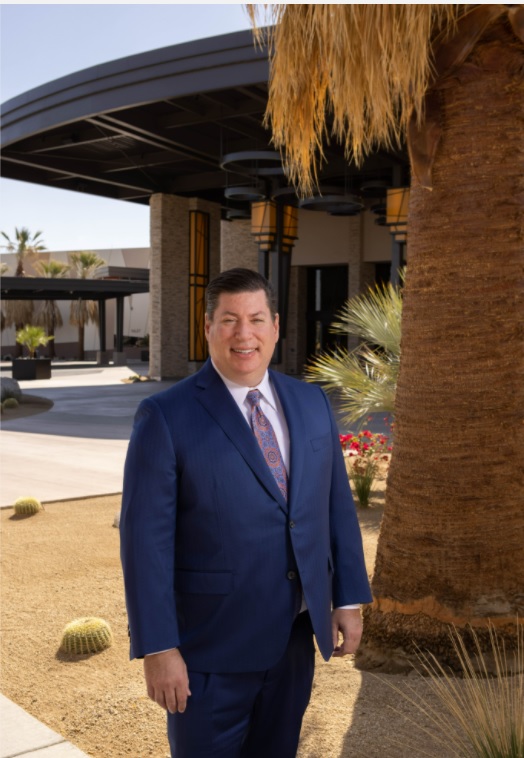
Image: Saverio Scheri, COO, Agua Caliente Casinos
Nor is gaming the only string on the Agua Caliente nation’s guitar. In addition to the dining, nightlife and spa options at its casino properties, it has recently diversified into the automobile industry with Agua Fuel. Despite having absorbed the body blow that was Coronavirus, things are looking up in the Agua Caliente sphere. We caught up with Scheri on a balmy spring day to see what had changed in the Palm Springs area since our last visit.
Is Agua Caliente Casinos still the biggest employer in the Coachella Valley?
We are certainly one of the largest in the entire Valley. What we strive for is for team members to wake up every day, be excited about coming to work and not looking at this as a job but as a career. We love to promote from within and I think that’s what’s made us one of the most popular employers in the valley.
How many people do you employ?
Over 3,000 now with our new additions to the family.
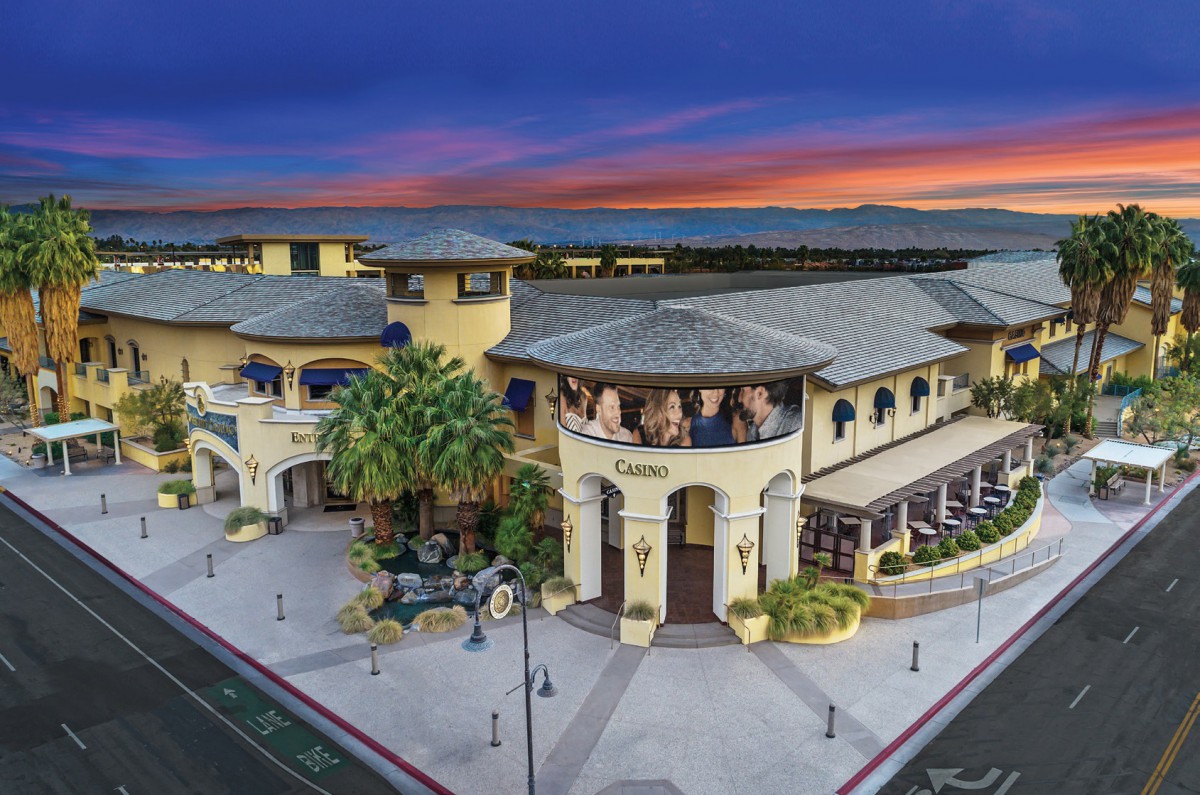
Image: Agua Calente Palm Springs
I’m sure it was difficult to navigate the variety of shutdowns that we were dealing with in the past year. How did Agua Caliente cope? When did you close and reopen, and how many people were you able to keep on payroll?
It was a very difficult time. We closed mid-March 2020 and we reopened at the end of May. The good news is that we were able to keep almost everyone on the payroll, even during the time that we were closed. We did it in a variety of different ways and our Human Resources department worked with team members to utilize their vacation time, but the Tribe really stepped up by giving everyone payments through the end of the following month. So for the folks that were out during the closure, they had very little or no disruption for themselves. When we reopened, we worked really hard to move those who were idle to other departments to keep them employed.
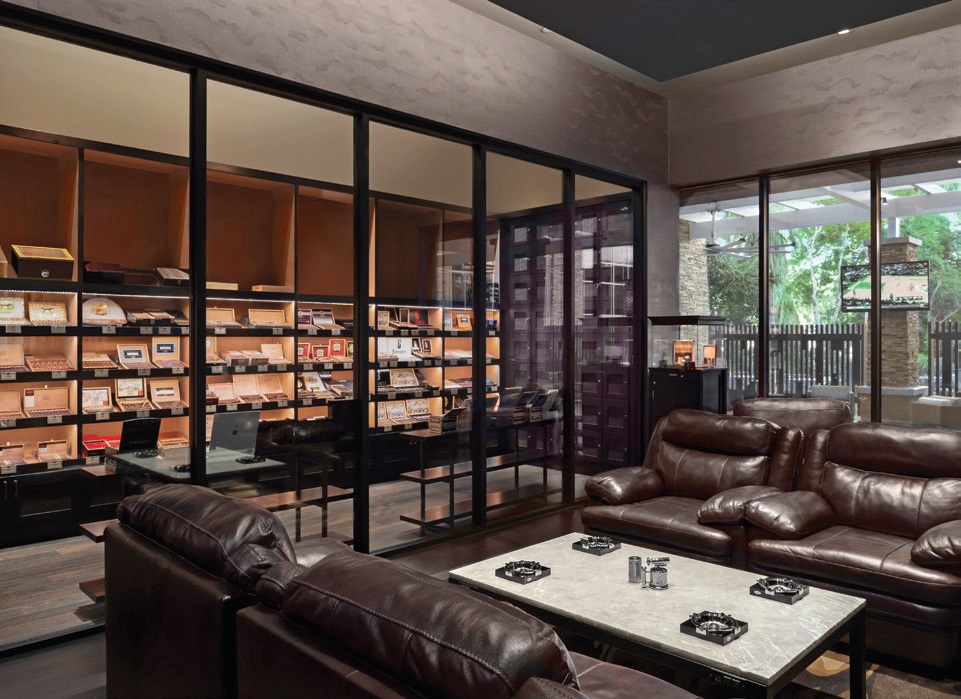
How soon did business return and how strong was demand when it did?
We’ve seen throughout the gaming industry where destination resorts got hit a lot harder because people wouldn’t get on planes and couldn’t get to places like Las Vegas. The regional casinos weathered much better than places in Las Vegas. What was really interesting was that we were able to track our visitation and volume and revenue and saw it was in direct correlation to Coronavirus caseloads. As caseloads rose, we saw visitation dip and as caseloads went down we saw visits go up. We followed that trend and we are still following that today. With cases coming down, we’re seeing that uptick in visits and revenue.
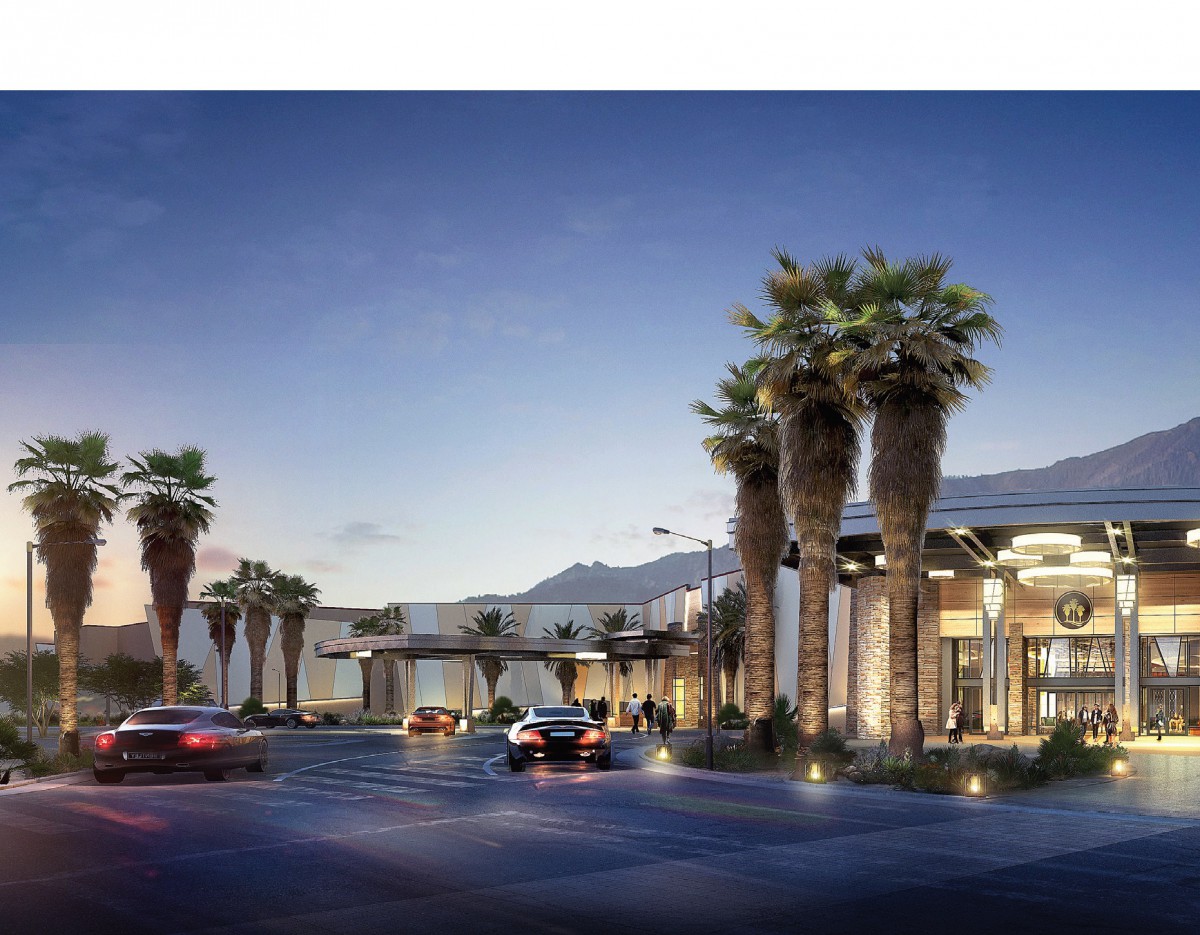
Image: Agua Caliente Cathedral City
And Cathedral City’s open now. It wasn’t the last time we talked?
I’m sitting in my office in Cathedral City right now.
How much gaming inventory does Cathedral City Casino offer and what sort of amenities?
We’re really excited about opening Cathedral City because it is a casino property unlike anything else. I’m proud to say that each of the Agua Caliente casinos has its own personality. Rancho Mirage has the feel of a destination resort with the pool and the spa and the hotel. Downtown has that hip vibe because it reflects downtown Palm Springs and there’s so much happening there. It’s very electric in downtown Palm Springs. In Cathedral City it’s a little bit more like you’re in a neighborhood casino. You come in, it’s very comfortable, the casino floor is laid out very nicely, with lots of space so you don’t feel crowded. We have over 500 slot games and we have table games here as well. We have an amazing sports book just like the one we have at Rancho Mirage. It’s called 360 Sports and it has giant, 4K screens and an amazing menu of both bar-food favorites and really exciting, innovative items as well. And it has its own personality. It certainly has a Latin feel here in Cathedral City in a couple of ways. We’ve got a great tequila bar called Agave Caliente with DJ’s, dancing, and live entertainment. We’ve got giant glass doors which, whenever the weather is nice – which is most of the time here in Palm Springs – we open the doors right up onto a beautiful pavilion, where we stage concerts and celebrity DJ’s. We can have dancing, comedians, food trucks, and private parties too. And then we have Café 111, which is more than just a three-meal restaurant. We have an amazing chef from Mexico City and he brings authentic Mexican dishes with hard to find ingredients. It’s so much better than your average Mexican restaurant. The flavors are amazing, the dishes are fantastic and very unique. You’ve got salads and burgers, and then you’ve got wonderful Mexican chicken mole, amazing fish tacos. It’s just so much fun. The food, music, and vibe is what gives this casino in Cathedral City a Latin personality.
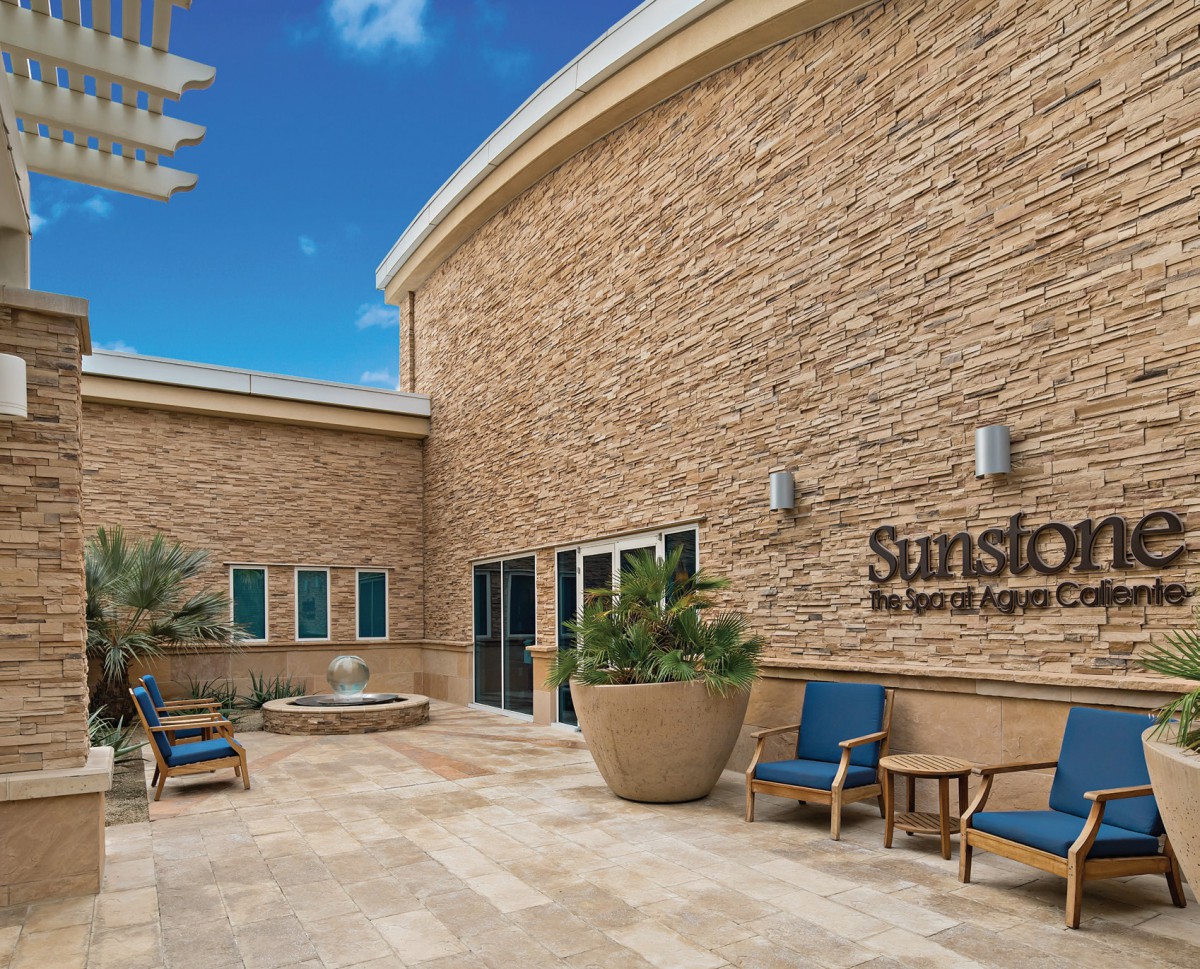
You always wax lyrical when you talk about your restaurants. Is that a big passion of yours?
Oh, absolutely. I can get on my soapbox a long time about what differentiates one casino from another. I’ll never forget casino executives in the late 90s when they said, “We’re going to turn Las Vegas into the dining capital of the world.” That was in the early Nineties. And he succeeded. That’s the thing that sets you apart. And then he did it again with entertainment. It was interesting to see that transition in Las Vegas and then for all the regional casinos to follow suit. We certainly look at things like entertainment and food to differentiate us from our competition, and to be successful at that it’s not just about having good service and good food. It’s about creating ingredients and dishes and menus, combined with a beautiful venue and fantastic customer service. And instead of just going out to eat, we create dining experiences, whether it be very casual – just walk up to our food district at Rancho Mirage – or the very high-end, first-class experience, to what we’re doing in Cathedral City, which is fun and exciting, it’s all about the experience. So we want people to remember Agua Caliente Casinos as their favorite place to go. It’s where you have the most fun. It’s where you feel the most comfortable. We have to execute across the board and it starts with the gaming floor for sure, but it extends out to everywhere. Our customer service, our food and beverage, our entertainment – the whole nine yards.
I recently saw the announcement of Agua Fuel opening next. Can you tell me a bit about this project?
The Tribe is opening a fuel station and convenience store right across from the Rancho Mirage resort. As you might expect, you’ll have your gas – and at a very competitive price – so we’re very excited about that. At the same time, it will offer the things you expect at a convenience store, as well as some of the things we provide over at the casino at Java Caliente, which is our coffee establishment. So we’ll have a Java Caliente in the fuel center. There will be a drive-through, which will be great because the folks who love our coffee, they can get it on their way to work, on their way home. They’ll pick it up and still enjoy what they have in the casino. We’re so thrilled for our customers to be able to fuel up before they get to the casino or after they leave at a very convenient locale and very good price for gas.
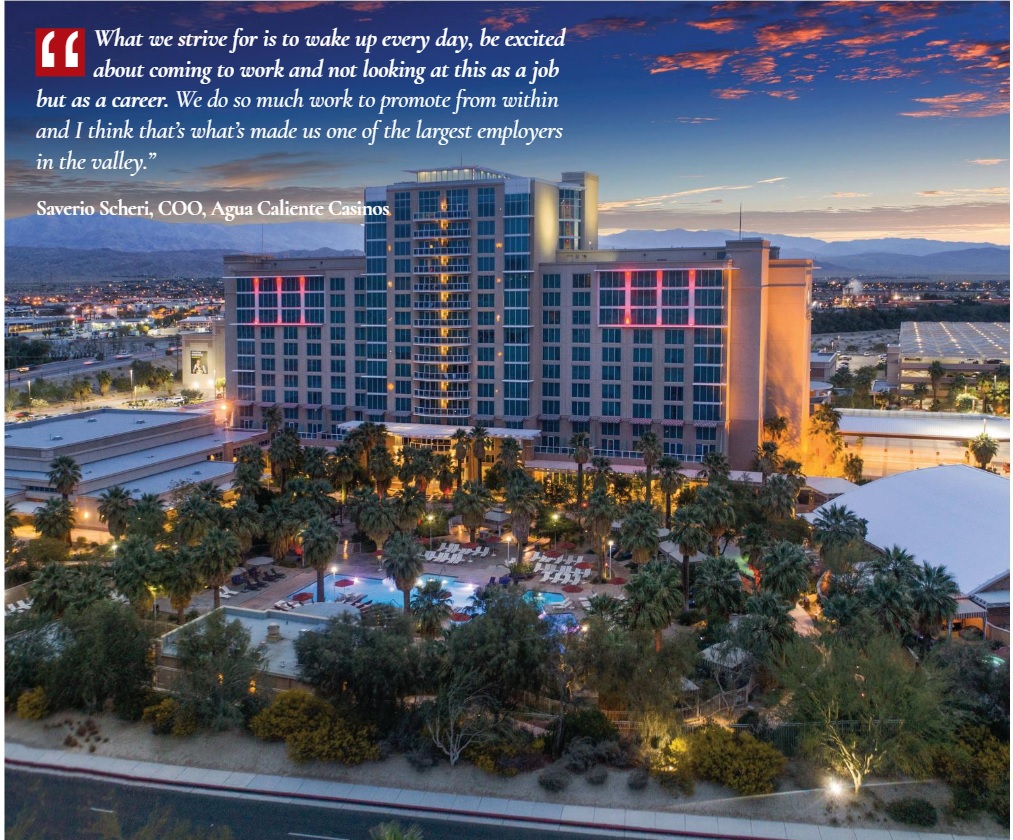
Image: Rancho Mirage Resort
How is the transition to cashless gaming affecting Agua Caliente?
Our business has traditionally focused on varying demographics. We certainly look to older folks, retired folks, people who are further along in their career and have more disposable income, typically. But at the same time, we don’t forget about our younger demographic because they’re so important to us for a number of reasons. They keep us fresh and exciting, we want them to be exposed to what Agua Caliente is offering. They don’t focus as much on the gaming aspect, but they love the hotel, the pool, the restaurants and the bars. We have a lot to offer them. So we’re always thinking of the younger demographic. They are in tune and comfortable with everything being cashless. They use their phone to pay. It’s not even taking out a credit card and tapping it. Now it’s their phone. We’re starting to see that extend everywhere, including into gaming. It’s not widely adopted yet but we’re providing it to our guests to give them more ways to customize their gaming experience.
During your time in the industry, there’s been so much change driven by technology. You launched a mobile app in 2020. What can you tell us about that?
You’re right, we’ve seen a lot of changes in the industry. I’ve been in gaming for almost 38 years in and I wouldn’t have believed you if you’d told me some of the things that would be possible today, including what you can do from an app on your phone. It’s really amazing: Everything from making reservations, booking rooms, interacting with maps, playing games – here in California we have play for free. We are looking at evolving that into something a little different eventually. We know sports betting is going to come to California like it has so many other states in the U.S. Again, all this is delivered through an app on your mobile phone. So we’ve got a great app where we’re evolving in tune with how things are evolving in the great state of California. We’re closely watching what’s working in other jurisdictions and how we would apply that here in California. What’s so different about that is it puts so much in the palm of your hand from a revenue standpoint for the casinos. It truly is amazing. Certain jurisdictions are making revenue from sports and racing that they couldn’t do if they couldn’t bet from their phones on Sunday mornings before the games start. And the best part is we’re not moving money from the casino to a mobile platform: What we’re seeing is the mobile platform becoming its own, brand-new revenue stream. So that’s very exhilarating news because we certainly don’t want to displace our existing brick-and-mortar gaming. But watching the mobile platform become a new revenue stream is very exciting to us. We’re looking at all different ways to be interactive, engage with our customers and provide a source of information, at the same time entertaining and engaging the customers.
Agua Caliente continues to win awards for best hotel, best casino, food, service and more, including four- and five-star rankings on Forbes Travel Guide. Right now, of what are you most proud?
I love that question. It is true that we get a lot of awards and I’m very proud of our team. We’ve moved from a three-star resort to a four-star resort and from a four-star spa to a five-star spa, and a brand-new, four-star steakhouse, along with many, many other awards. I’m so proud of the work the team members have done to achieve that level of excellence. What I tell our team members every day is that we’re not doing the things that we do to win just to win awards; we do these things, and many of them are very difficult, we do them to provide the best guest experience we possibly can, creating the “ultimate” guest experience is always our goal. It’s not so much the award, as it is the journey and the effort that our team members put forth that provides that fantastic guest experience. Our whole approach here is called “ACE” which stands for “Agua Caliente Experience.” We’ve created our own guidelines for what that experience is in every venue and every single team member is trained about how to deliver that “ultimate” guest experience. It’s reinforced on a regular basis. They’re attentive and rewarded for the work that they do – and they’re held accountable for providing that level of customer service we provide for all of our guests. That is one of the things that really, truly separates us from our competition: our attention to detail and our focus on providing that ultimate guest experience. It’s those kinds of things that really sets us apart and it adds up to a huge difference. It’s incredible recognition because it shows how hard everyone works to get us there.
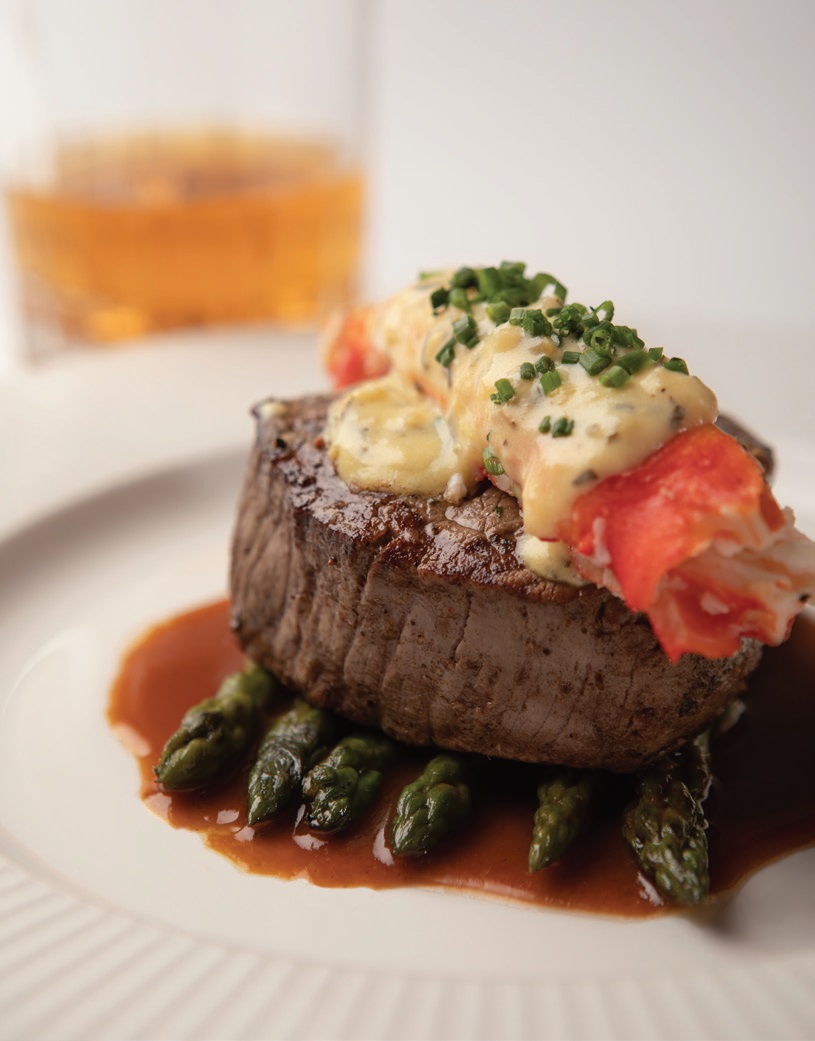
Esports is booming right now, especially during the pandemic. What can you tell us about Agua Caliente’s esports program?
Esports is a big component of our offerings. We were doing a lot more with it pre-Covid. Social distancing has certainly changed the way we do our esports, but we’re looking forward to get that going again. And now with two of our three venues having our 360 Sports bar, that’s where we’re doing our esports, so it’s absolutely a remarkable venue for esports. We’ve got folks that are dedicated to that product and it’s attracting a whole new demographic to our properties, which we’re very excited about and we think that the future of esports is unlimited. It’s going to develop in so many different directions. We’re embracing it and we’re excited to see our customers embrace it as well.
As COO, you play a key role in all aspects of design, development and operations. What are you focused on right now?
Right now my focus is on providing a safe environment for our team members and our guests, and that’s an everyday focus of mine. We have to make sure that we come to work every day safe, and at the same time, we have to focus on the job we have to do, whether it be someone in accounting or information technology or a server in a restaurant or a slot attendant on the casino floor.
Aside from the daily COVID-19 safety efforts, I am focused on increasing our business at our existing properties while at the same time looking for new opportunities to expand the Agua Caliente Casinos brand.
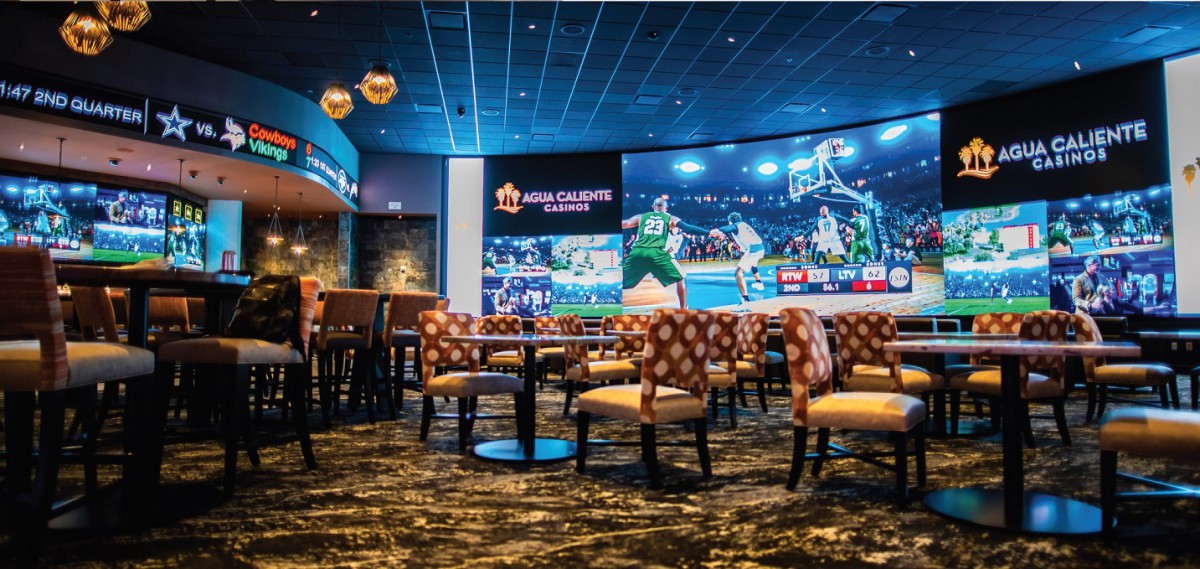
Big picture, do you have any predictions about the industry in general and its direction in the coming year?
I gave up making predictions last year. I thought we’d only be closed for Covid for three or four weeks; then I anticipated that COVID would be over by August. A lot of us were wrong about that. But in general, having been in gaming since the early Eighties, the one thing I know about this industry is it’s resilient. It’s weathered a recession, it’s weathered 9/11, it’s weathered the crash of ’08 and it will weather Covid, and we will come out stronger on the other side. I look at it a little differently. Maybe it’s why I have such a passion for what I do. I look at us as a very important escape for people. Everyone has had a tough year. But when you have a chance to walk into a first-class casino resort like Agua Caliente and spend some time with us, whether it’s a few hours or a few days, you get to leave all that behind. You get to play some fun casino games. You get to eat some food that you probably don’t have around the corner from your house. You get to stay in a beautiful hotel, swim in a great pool, see one of your favorite bands. It’s a wonderful, wonderful escape – and I think that’s important for people, probably more so today than ever.
Interview by David McKee Editor Casino Life
# This interview was originally published in April 2021 Issue 144 Casino Life #
By the early 1990s the active horse racing had closed down and was replaced by greyhound racing which has continued to this day. Many dogs break in at Caliente where there are 13 races every night and matinee races on weekends. Greyhound races: Monday to Friday from 7:45 p.m., and Saturday and Sunday from 2 p.m.
The Glitter of Agua Caliente
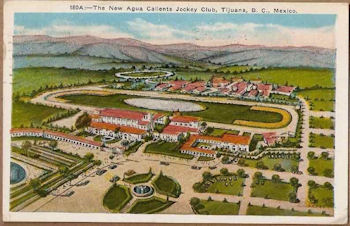
At first, it seemed the racing gods didn’t want Tijuana to have a racetrack. The original track, the Tijuana Jockey Club, was destroyed twice in its first year before John D. Spreckels who owned the Hotel del Coronado in San Diego stepped in to save it.
Financed by San Francisco boxing promoter James W. Coffroth, the Tijuana Jockey Club opened with a lot of publicity in January 1916, following Mexico’s 1915 decision to legalize gambling. Joining Coffroth was Baron Long, the owner of San Diego’s Hotel U.S. Grant. That initial track location was near the U.S./Mexico border and the six horse races on opening day drew 10,000 Californians who were denied betting legally on horse racing at home.
The San Diego Union at the time reported, “Surrounded by the mauve hills of old Mexico, as though nature intended the spot for the site, lies the magnificent new Tijuana race course, a few miles from the thriving little village.”
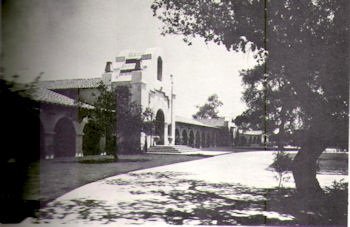
Its border location was also its downfall as it was built on the low ground of the Tijuana riverbed. The sparkling new facility was only one week old when the “nature that intended for the spot” included heavy rains and the worst flooding in 25 years which destroyed the track. To keep the momentum, they hastily rebuilt and reopened in April. But fortune still eluded them and that same season a fire ravaged the track. That’s when Speckels stepped in with financial aid; they reopened the Jockey Club the following year.
Over the next decade, prohibition in the U.S. had fun-seeking Americans flocking south to several newly opened Baja resorts and casinos. In 1928 American entrepreneurs built a beautiful casino and hotel at Aqua Caliente (hot water) on higher ground on the outskirts of Tijuana at a cost of $2.5 million. The following year, they added the Hipodromo Agua Caliente (Caliente Race Track) on the higher location, opening in late 1929. The horsemen from the Tijuana Jockey Club had moved up the hill.
Hollywood Celebrities Flocked to Caliente

From the very beginning, Caliente attracted celebrities. Western cowboy Tom Mix was once an honorary field judge at the racetrack. World famous boxer Jack Dempsey, who went on to become one of the principals of the Riviera Resort and Casino in Ensenada, was also an honorary starter at Caliente. Charlie Chaplin, John Barrymore, Babe Ruth, Wallace Beery, Buster Keaton, Al Jolson, Constance Collier and Jean Harlow all visited Caliente during its heyday.
Guests were entertained in the lounge by the song and dance team of Rita Hayworth (Margarita Cansino) and her father who were billed as “The Cansinos.” The daughter of Spanish dancer Eduardo Cansino and his Irish wife Volga Haworth, young Rita was eventually “discovered” in Baja by a Fox Studios executive. By the early 1940s she was a Hollywood star, featured in movies with the likes of Tyrone Power and James Cagney.
The publicity surrounding the Caliente Race Track and its predecessor, the Tijuana Jockey Club, helped attract top horses from the very beginning. In 1917, the Spreckels Handicap which offered a $4,000 purse to the winner honored the man who helped resurrect the track. It grew in value and prestige until 1930 when its name was changed and it became the Agua Caliente Handicap, the first in North America to offer a $100,000 purse.
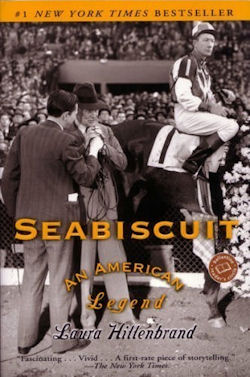
Horses were attracted from all over, including the eastern U.S. and abroad. The great Australian horse Phar Lap won the Agua Caliente Handicap in 1932, earning that richest purse in North America. In 1938 the indomitable Seabiscuit also won the Agua Caliente Handicap, as did the popular horse Round Table 20 years later.
Agua Caliente was the site of several industry firsts, including starting gates, safety helmets, and “pick six” wagering. Caliente’s famous 5-10 was the forerunner to many pick-six wagers and had big payoffs.
When Mexico outlawed gambling in 1935, the adjacent resort and casino were closed but the Agua Caliente Racetrack continued to operate for many years. The original grandstand structure was destroyed by fire in 1971, but was rebuilt.
One Baja legend concerns Kentucky Derby day at Caliente in 1974. It was long a tradition at Caliente to keep the betting windows open as long as possible to accommodate every possible bet. Well, that day one over-zealous clerk was still selling tickets on the Derby long after the winner, Cannonade, had crossed the finish line. A handful of lucky touts who appeared to have had a crystal ball have been telling their winning story for years.
In more recent decades, Caliente was important to the California thoroughbred racing community as lower training costs and lower purses made it economically feasible to test young horses in competition. It was a wonderful training ground for horses preparing to race elsewhere. Then the grooms decided to strike and while shut down, the track owners found Sports Book wagering to be extremely profitable, especially without the overhead of live thoroughbred racing. The track also went to the dogs, quite literally, as they discovered dog racing a much more economical pursuit.
By the early 1990s the active horse racing had closed down and was replaced by greyhound racing which has continued to this day. Many dogs break in at Caliente where there are 13 races every night and matinee races on weekends. Greyhound races: Monday to Friday from 7:45 p.m., and Saturday and Sunday from 2 p.m.
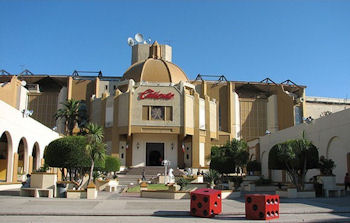
In addition to the greyhounds, the venerable Caliente Race Track, now called the Hipodrómo de Agua Caliente, is open to the Caliente Foreign Book wagering where closed circuit TV monitors offered a sports medley that should provide a fix for the most discriminating sports betting junky.
Caliente Sports Books can now be found in almost every town of any size in Baja California. There’s one in San Felipe, one in Rosarito Beach, and one in the San Nicolas Hotel in Ensenada. But the Agua Caliente racetrack itself has turned from an international gathering place into a shadow of its former self. Even part of the grounds have been put to a more practical and beneficial use than the glitter of yesteryear. There’s now a school housed at Caliente to help educate the children of Tijuana.
About Greg
Greg Niemann, a long-time Baja writer, is the author of Baja Fever, Baja Legends, Palm Springs Legends, Las Vegas Legends, and Big Brown: The Untold Story of UPS. Visit Greg’s website.
The player’s PIN-protected Cashless Wagering Account can fund both variations either digitally through external sources via IGTPay or through cash deposits at the casino cashier, kiosks, and slot machines.
IGT to implement Resort Wallet and IGTPay solution at Agua Caliente Casinos
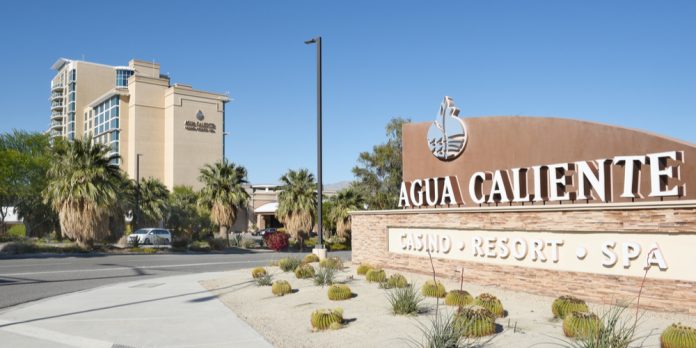
Image source: Steve Cukrov/Shutterstock
International Game Technology PLC (IGT) has announced it has reached an agreement to implement its Resort Wallet cashless solution and its IGTPay full-service funding solution at all three Agua Caliente Casinos in California.
The deployment of Resort Wallet and IGTPay solution will provide patrons at the Agua Caliente Casino Resort Spa Rancho Mirage, Agua Caliente Casino Palm Springs, and Agua Caliente Casino Cathedral City mobile access to funds from all available types of external sources.
The available sources can include credit and debit cards, bank accounts, and e-wallets, reducing the contact with cash while increasing player loyalty through enhanced convenience.
“We’re proud to be at the forefront of global gaming technological innovation with this new service, and are excited to leverage Resort Wallet and IGTPay to power the industry’s most seamless loyalty program.”
Ryan Reddy, IGT Senior Vice President of Global Product Management for VLT, Systems, and Payments, added: “Implementing IGT’s Resort Wallet and IGTPay solutions will position Agua Caliente Casinos in the vanguard of advanced casino technology and player convenience.
“By uniquely giving players seamless access to all major funding sources, Agua Caliente Casinos can enhance player engagement and loyalty and attract a more diverse player demographic, which can ultimately lead to increased revenues and profitability.”
Agua Caliente Casinos is scheduled to implement the full suite of IGT’s Resort Wallet modules in 2021, which includes both flexible variations of the company’s cashless offering: cardless and carded.
The player’s PIN-protected Cashless Wagering Account can fund both variations either digitally through external sources via IGTPay or through cash deposits at the casino cashier, kiosks, and slot machines.
Cashless Wagering Account funds are securely maintained for the next play session or property visit, and players can also transfer funds between slot machines onsite, as well as between Agua Caliente’s other properties, or withdraw funds into a bank account.
As part of the planned IGTPay full-service funding deployment, Agua Caliente Casinos will benefit from the company’s experienced payments team, which has been operating in digital gaming markets since 2013 and will support all aspects of payment-related services.
With the cardless variation of Resort Wallet with IGTPay, players will be able to use Agua Caliente’s Play Agua mobile app to access their Cashless Wagering Account. Players tap their smartphone on a slot machine to card in and transfer funds electronically to the game.
For patrons who prefer to use physical cards, the carded cashless variation of Resort Wallet enables them to use their Agua Caliente ACE Club card to access their Cashless Wagering Account. With it, players insert their card into a slot machine and transfer the funds into the game.
Following the launch of cashless slot play, Agua Caliente Casinos plans to extend its Resort Wallet-enabled cashless capabilities to table gaming and retail services throughout the enterprise.
The IGT ADVANTAGE system enables responsible gaming information to be displayed through the service window and NexGen display on the slot machine, as well as through notifications on the Resort Wallet-enabled cashless wagering mobile app.
